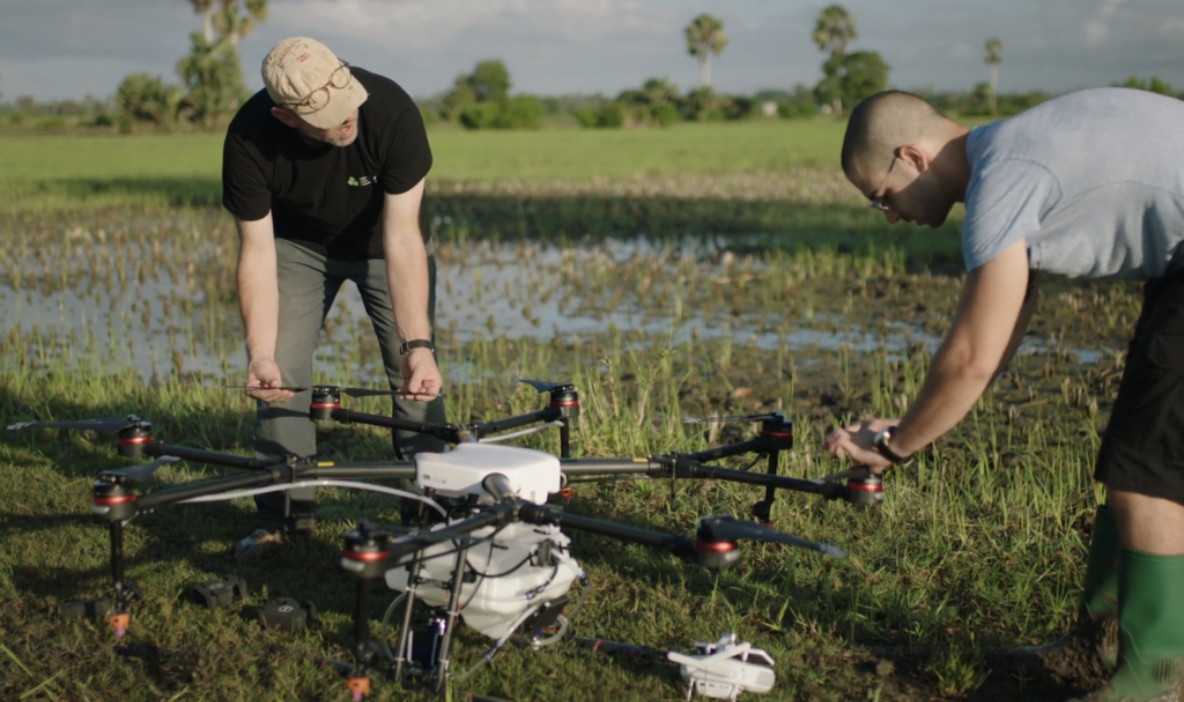DJI’s Agras drones are being used by scientists in Tanzania to combat mosquito populations. The Agras MG-1S, typically adopted by farmers to spray pesticides over crops, is one element of a revolutionary attempt to fight Malaria.
The equipment is being customized and used by entomologists in Zanzibar in a pilot project that could eventually change the way mosquito populations are controlled.
Drowning mosquitos with help from DJI
The Anti-Malaria Drones project is being led by Dr. Bart Knols. The new method of fighting mosquito populations involves spraying infested rice fields with a unique non-toxic and biodegradable silicone-based liquid. The liquid is spread across stagnant water, creating a thin film that prevents pupae and larvae from breathing at the surface – effectively causing them to drown.
The trail started in October in Zanzibar. The aim is to show that the precision application of biological insecticides in rice fields can significantly reduce the local mosquito population. The team will sample the larval and emerging mosquito population before, during and after spraying to determine the possible impact of the approach. If successful, it could be rolled out across the continent.
“This experience has been made possible thanks to a customized DJI Agras MG1-S spray drone, enabling the deployment of the Aquatain liquid over rice paddies”, said Dr. Bart Knols, the scientist behind the project.
“The use of spray drones proves to be essential in efficiently treating large rice fields, because spraying by hand is very time consuming and using a helicopter is too expensive and simply not realistic.”
In the pilot project, several rice paddies in Zanzibar are being sprayed with differing levels of the organic pesticide. Some are not being sprayed at all to provide a benchmark to measure the results against.
The hope is that in the fields sprayed with the Aquatain liquid, the numbers of mosquitos emerging into adulthood will be significantly reduced, which will, in turn, lead to a drop in bites and a local reduction in the transmission of malaria.
After the trial, the scientific team intends to publish the findings in a scientific journal generate publicity around the new method.
“This pilot project is the first attempt to fight malaria with spray drones on such a large scale. If the results of these tests are as good as expected, this could give a tremendous boost for winning the fight against malaria,” said Professor Wolfgang Richard Mukabana from the University of Nairobi.
DJI tech used for good, again
This isn’t the first time DJI’s drones have been used for good. The company already supplies search and rescue teams, inspection crews, public safety officials and more with life-saving technology.
“We are proud to be pioneers in this field along with scientific experts using our spray drones against malaria in Africa, and we have great hopes that this approach will significantly contribute towards defeating this fatal disease in affected regions around the world”, said Dr. Barbara Stelzner, Director of Marketing and Corporate Communication at DJI Europe.
“Reducing the cases of new malaria infections will not only put an end to all the suffering of people, but it will also contribute to generating larger harvests, and provide new economical perspectives in Africa.”
The sky’s the limit: Could drones help eliminate malaria altogether?
In conjunction with the new pesticide that builds a physical barrier rather than a chemical one, drone technology could soon play a huge role in fighting malaria around the world.
In an interview, Dr. Bart Knols argues that some countries in Africa could see the disease eliminated completely if the right steps are taken.
“If you’re asking me what is my vision with this technology I would tell you: I see several countries in Africa that could use drone technology to actually eliminate their malaria problem.
Two examples: the Gambia in West Africa. You could use drones to spray all of the river’s flood plains and remove your malaria problem there. Second, Sudan: the Nile river. You could use drones flying up and down the Nile to control these mosquitos and get rid of malaria altogether.
There’s really a role to play for drone technology in eventually moving malaria down to zero.”

